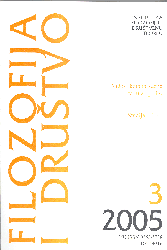Glasovi iz kante: McLuhan, digitalni apsolut i problem regresivnog napretka (Prilog materijalističkoj epistemologiji medijskog diskursa)
Voices from the Can: McLuhan, the Digital Absolute and the Problem of Regressive Progress (Towards a Materialist Epistemology of Media Discourse)
Author(s): Borislav MikulićSubject(s): Philosophy
Published by: Institut za filozofiju i društvenu teoriju
Keywords: media theory; media forms; instantaneity; simultaneity; McLuhan; hermeneutical epistemology of perception; psychoanalytic literary hermeneutics; the “End of Ideology” thesis; MacIntyre;
Summary/Abstract: On the basis of selected examples of average lay as well as professional and theoretical discourses on the media phenomenon and the very notion of media, the author seeks to identify moments conducive to constructing a model for media analysis of a social-theoretical bent, and both structural-semiotic and substantive-critical in character. The analysis refers to the media in both the strict (technological) and the expanded (semiological) meaning of the term – as technical devices and semiotic objects, such as discourses of ideology, science and literature. In the first section (I. 1-3), almost entirely devoted to Marshall McLuhan’s brief and legendary text “The Medium Is the Message”, his basic thesis is put under a discursive-logical analysis of the text and reverted into the seemingly diametrically opposed form, “The Message Is the Medium”, whose further interpretive possibilities are then explored. In the second section (II. 1-3) McLuhan’s “integral” approach to media analysis, as a particular theory (communication theory), is examined by placing it in the discursive context along with the “End of Ideology” thesis from the 1960s and instances of humanistic-scientific discourse on non-technological media forms (hermeneutic theories of perception, psychoanalysis of narrative strategies in fictional discourses). The aim of the discussion is to relocate the phenomenon of conceptual regression (whether substantive, cultural, or ideological) in discourses presupposing absolute innovativeness and progressiveness of their media form. The result of the inquiry shows that regressiveness lies in the “progressive” media form itself, that is, in the very conceptions (theories, ideologies) of the form.
Journal: Filozofija i društvo
- Issue Year: 2005
- Issue No: 28
- Page Range: 9-69
- Page Count: 63

